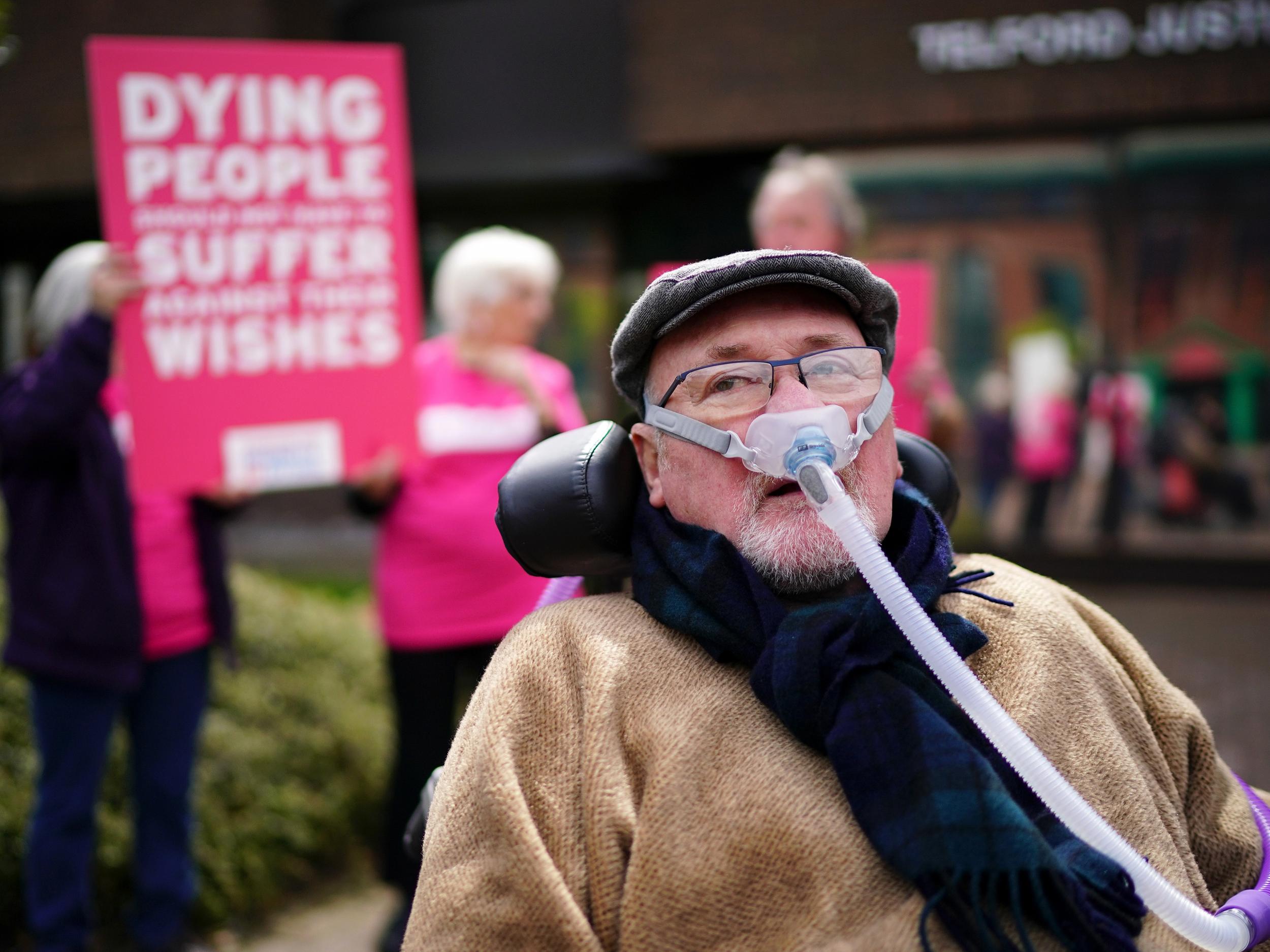Terminally ill man begins appeal against ban on assisted dying
Retired lecturer with motor neurone disease says law is preventing his 'dignified death'

A terminally ill man has begun an Appeal Court challenge against a ban on assisted dying, arguing he should not be forced to endure a “distressing and undignified” death.
Noel Conway, who says he feels “entombed” by his motor neurone disease, is fighting for the right to enlist medical professionals to end his life.
Yhe High Court rejected the 68-year-old’s challenge to the Suicide Act, which criminalises euthanasia last October. However, in January judges said the retired lecturer from Shrewsbury could appeal that ruling.
Mr Conway, who wants the right to an assisted death when he has six months left to live, still has the mental capacity to choose to die and has made a “voluntary, clear, settled and informed” decision.
He is proposing High Court judge should determine if a person meets those criteria.
Outlining his case to three senior judges, his lawyers said the law currently interferes with his rights. The court must decide whether that interference is “justified and proportionate”, they added.
“The question for this court is not a very generalised one of the morality or ethics of allowing doctors to assist patients to die," Nathalie Lieven QC said.
“The question for this court is rather a focused one of whether for this very specific cohort, ie terminally ill people with less than six months to live, the ban is justifiable because of an impact on the weak and vulnerable.”
Mr Conway had previously asked the High Court for a declaration that the Suicide Act 1961 is incompatible with Article 8 of the European Convention on Human Rights, which relates to respect for private and family life, and Article 14, which protects from discrimination.
He was too unwell to travel to London for the hearing but will watch proceedings over a video link from Telford Crown Court.
In a statement ahead of the hearing, he said he is now dependent on a ventilator for up to 23 hours a day and only has movement in his right hand, head and neck.
”I know this decline will continue until my inevitable death,” he said. ”This I have sadly come to terms with, but what I cannot accept is that the law in my home country denies me the right to die on my own terms. Why can I not be given the chance to say goodbye to my loved ones and go with dignity, in my own home, when the time is right for me?"
He added: “I’ve been touched by the outpouring of support and well wishes I’ve had from members of the public, others nearing the end of their lives and people who have seen just how much damage our broken law can do. For all of these people, I will keep on fighting.”
Mr Conway said his current options are to “effectively suffocate” by choosing to remove his ventilator or to spend thousands of pounds travelling to Switzerland to end his life, knowing his family would risk prosecution if helped.
Ms Lieven told the court there is “serious objective evidence” upon which Mr Conway concludes there is a real risk his death would not be “quick and painless” if he refuses ventilation.
She added: “Mr Conway reiterates that, if suitable safeguards are in place, the wider interests of society cannot possibly be said to require him to undergo such a death in the name of securing against possible risks to weak and vulnerable individuals.”
The barrister argued that a proper analysis of the safeguards proposed by Mr Conway would have shown that the current “blanket ban” on assisted suicide is not necessary. She said the proposal of having a High Court judge oversee the process was “at the heart” of the issue.
Ms Lieven also argued Mr Conway’s proposals could not pose any “wider risk” to society.
She said: “Mr Conway is dying because of the effects of his illness any change in the law could not, itself, increase the number of those with terminal illnesses. It could not therefore, per se, give rise to any increase in risk of death amongst (for instance) those with disabilities who are not terminally ill, and hence any wider risk to the general community.
“Indeed, it could just as easily be said that the real question is not whether the wider interests of society require Mr Conway to be denied assistance with dying, but whether society, as a whole, can be said to have any legitimate interest in denying Mr Conway any choice in when and how he dies in circumstances where he is already dying in other words, to exercise one of the few meaningful decisions about his end of life that remain available to him.”
Ms Lieven said it was for Mr Conway to decide what he considers to be “distressing and undignified” and that he is the “best judge” on a matter as “intimately personal” as how he dies.
Mr Conway is being represented by law firm Irwin Mitchell and supported by the campaign group Dignity in Dying and Humanists UK.
His appeal is opposed by the Secretary of State for Justice, with campaign groups Care Not Killing and Not Dead Yet UK also making submissions against it.
The appeal before Sir Terence Etherton, Sir Brian Leveson and Lady Justice King is expected to last three days.
Subscribe to Independent Premium to bookmark this article
Want to bookmark your favourite articles and stories to read or reference later? Start your Independent Premium subscription today.

Join our commenting forum
Join thought-provoking conversations, follow other Independent readers and see their replies